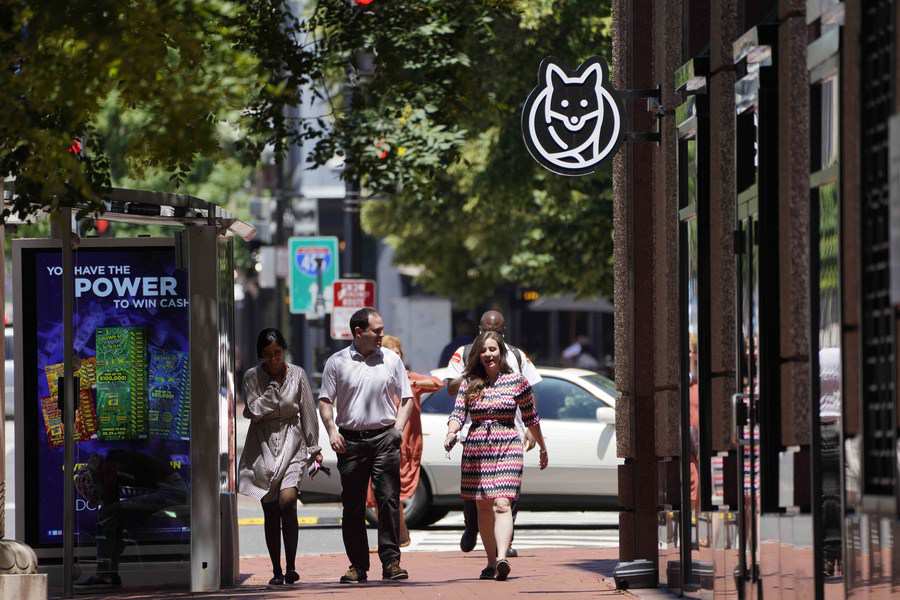Biden's plan to remake U.S. suburbs sparks controversy among homeowners

Pedestrians walk on the street in Washington, D.C., the United States, June 17, 2021. (Photo by Ting Shen/Xinhua)
Critics, however, said loosening restrictions on housing causes homes to lose value, in a nation where a family's entire life savings are often wrapped up in the value of their home.
WASHINGTON, June 20 (Xinhua) -- Jen Smith, a homeowner in an affluent suburb outside Washington, D.C., is not happy about U.S. President Joe Biden's plan for neighborhoods like hers.
"There's a low-income development a couple of miles down the road," the manager of a small company, in her late 40s, told Xinhua.
That development, a small-scale bid to bring affordable housing to wide open suburban areas, is the source of unruly teenagers who drive recklessly down the local road, she said.
During summer, she said, many of these low-income teens loiter in front of stores in the local town center, "doing nothing. No summer job, no nothing" - in sharp contrast to the more affluent teens in her development, who spend their time at home studying, she said.
She said the last thing she wants is more low-income housing in her area.
Indeed, having a big house with a yard and a white picket fence is part of the American dream. But Biden's infrastructure bill calling for cities to limit single-family zoning to build affordable housing may change that image.
Biden wants to place more multi-family residences, including apartments and garages converted to living spaces, in suburbs that have always been zoned for single-family units. The president wants to make this part of his 2.3 trillion U.S. dollar infrastructure plan, which would permit smaller lots and multi-family units to be constructed next to a single family house.

A runner is seen in Lincoln Park in Chicago, the United States, on June 11, 2021. (Photo by Joel Lerner/Xinhua)
Critics of how traditional suburbs are constructed contend that large suburbs and the zoning laws that govern them hog up much-needed space and trap low-income Americans in crowded urban neighborhoods.
Biden's plan, if passed by Congress, would give tax credits and grants to cities that change zoning laws to provide more affordable housing to people who want to escape cities but who cannot afford to move to expensive suburbs.
U.S. Housing and Urban Development Secretary Marcia Fudge told USA TODAY in April that the White House's plan would undo policies she said discriminate against people of color.
"The result of this sort of investment will be critical to increasing housing options for low- and moderate-income families," Fudge said.
Critics, however, said loosening restrictions on housing causes homes to lose value, in a nation where a family's entire life savings are often wrapped up in the value of their home. They contend that remaking suburbs into higher-density areas would harm schools, clog roads and lead to many quality of life problems such as noise from neighbors.
They also worry about problems that have been rampant in cities, including street racing - and the deadly crashes the illegal sport causes - the pungent smell of marijuana that now seems inescapable in the streets of cities like New York.
"A legitimate reason for regulating density is to assure that the density of the residential environment is appropriate for the existing public infrastructure," argued Gerritt Knapp and Nicholas Finio, two urban planners at the University of Maryland, College Park, in the Journal of the American Planning Association.

People walk in the heat in the Kenneth Hahn State Recreation Area, Los Angeles, California, the United States, June 17, 2021. (Xinhua)
Many, like Smith, also worry about crime increases, at a time when violence in urban areas is reverting back to the record levels seen in the early 1990s.
Arleen Snider, in her early 50s and in management at a mid-size company, said she does not approve of Biden's plan.
"I feel it will attract danger to a once quiet and safe neighborhood, I know it does sound like stereotyping, but that's reality," said the homeowner in a quiet DC-area suburb.
Biden has pushed the issue since he came to office.
The president in January signed an executive order that required the U.S. Department of Housing and Urban Development to review the former administration's "Preserving Neighborhood and Community Choice." That rule rolled back a previous rule, during former President Barack Obama's time in office, aimed at preventing housing discrimination.
During his last months in office, former President Donald Trump often said that Democratic-led efforts geared toward low-income housing would "destroy" the suburbs.
Ellie Jefferies, a retiree in the U.S. state of New Jersey in her 70s, said that while the government will try to push middle class suburbs to open up to low-income housing, Washington politicians will not force this on their millionaire friends. Rather, they will force it on the nation's middle class, she said.
"I bet there won't be any of these units in the Hamptons or Malibu," she said, referring to two well-known communities of multi-millionaires.
Photos
Related Stories
- Biden's plan to remake U.S. suburbs sparks controversy among homeowners
- Biden to host Israeli president on June 28
- Biden’s way of slamming Beijing-Moscow relations is humiliating Russia
- Framing Chinese-U.S. competition as contest between systems undermines Washington's interests: media
- Uncertainties ahead in transatlantic ties despite Biden's symbolic gesture
Copyright © 2021 People's Daily Online. All Rights Reserved.










